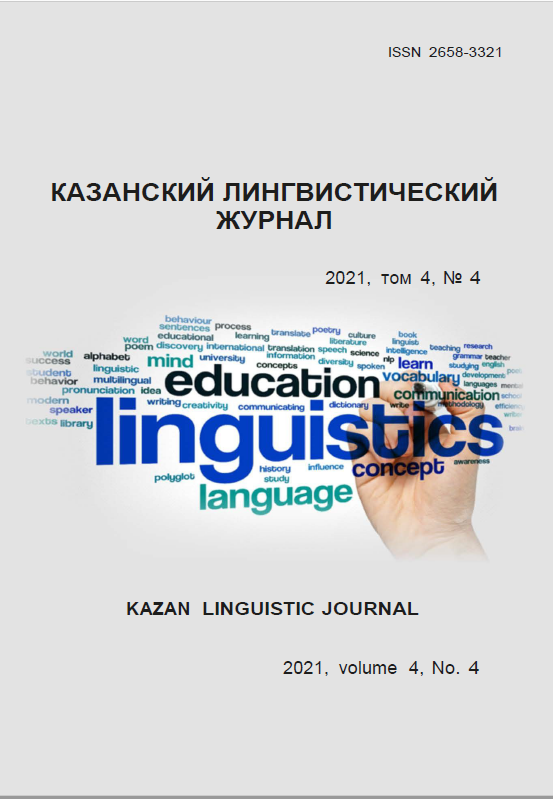Representation of the concept “музыка/musik” in Russian and German linguocultures
https://doi.org/10.26907/2658-3321.2021.4.4.550-564
Keywords:
concept, linguoculturology, conceptual component, value component, figurative component, Russian linguoculture, German linguocultureAbstract
The article is devoted to the comparative analysis of the concepts «музыка» / “Musik” in Russian and German linguocultures in the conceptual (based on lexicographic sources) and figurative (based on the results of a free associative experiment) aspects.
Concept is a key term of two relevant areas of modern linguistics – cognitive linguistics and linguoculturology. The problem of unambiguous interpretation of this term has not yet been resolved. There are two main approaches to the study of concepts – linguocognitive and linguocultural. The authors of the article combine these two approaches, understanding the concept as a mental formation (linguocognitive approach) reflecting in itself the elements of culture (linguocultural approach), consisting of core, near-core conceptual layers and periphery (linguocognitive approach), conceptual, value and figurative components (linguocultural approach).
The research of concepts is of great interest to the scientific community, because it allows to reveal the peculiarities of thinking of representatives of different linguocultures and specific national characteristics fixed in the language.
The main research results: the concepts «музыка» / “Musik” have similar definitions in Russian and German languages, have the same origin and are represented in the minds of representatives of Russian and German linguocultures in the same way, despite some individual differences in understanding related to the periphery of these concepts.
References
References
Babushkin A.P. Types of concepts in lexical and phraseological semantics of the language: thesis for degree in philology. Voronezh: Izd-vo VGU; 1996. (In Russ.)
Popova Z.D., Sternin I.A. Essays on cognitive linguistics. Voronezh: Izd-vo VGU; 2002. (In Russ.)
Kubryakova E.S., Demyankov V.Z., Pankrats Yu.G., Luzina L.G. A concise dictionary of cognitive terms. Moscow: Izd-vo MGU, 1996. (In Russ.)
Stepanov Yu.S. Constants: Dictionary of Russian culture. 3rd ed., rev. and exp. M.: Akademicheskii Proekt; 2004. (In Russ.)
Vorkachev S.G. Linguoculturology, linguistic personality, concept: the formation of an anthropocentric paradigm in linguistics. Filologicheskie nauki, 2001; (1): 64–72. (In Russ.)
Karasik V.I. Language circle: personality, concepts, discourse. Volgograd: Peremena; 2002. (In Russ.)
Dal V.I. Explanatory dictionary of the living Great Russian language. Available from: http://slovardalja.net/word.php?wordid=16075 [accessed: 22.08.2021]. (In Russ.)
Efremova T.F. New explanatory and word-formation dictionary of the Russian language. Available from: https://efremova.slovaronline.com/ [accessed: 22.08.2021]. (In Russ.)
Kuznetsov S.A. A large explanatory dictionary of the Russian language. Available from: http://endic.ru/kuzhecov/M/18.html. [accessed: 22.08.2021]. (In Russ.)
Mikhailova O.V. Explanatory dictionary of the Russian language. St. Petersburg: OOO “Poligrafuslugi”, 2005(In Russ.)
Ozhegov S.I. Explanatory dictionary of the Russian language. Available from: https://slovarozhegova.ru/word.php?wordid=15023. [accessed: 20.09.2021]. (In Russ.)
Ushakov D.N. Explanatory dictionary of the Russian language. Available from: https://ushakovdictionary.ru/word.php?wordid=30927. [accessed: 20.09.2021]. (In Russ.)
Brockhaus Wahrig German Dictionary: in 6 volumes: ed. by Gerhard Wahrig, Hildegard Krämer, Harald Zimmermann 4th Volume. Wiesbaden: F.A. Brockhaus; Stuttgart: Deutsche Verlags-Anstalt GmbH; 1982. (In German)
Duden. The online dictionary. Available from: https://www.duden.de/rechtschreibung/Musik. [accessed: 20.09.2021]. (In German)
Duden. The Great Foreign Dictionary: Origin and meaning of foreign words: ed. from the Scientific Council of the Dudenredaktion. 2nd, revised and expanded edition. Mannheim; Leipzig; Wien; Zürich: Dudenverlag; 2000. (In German)
Kempcke, G., Seelig V. e.g. Dictionary. German as a foreign language. Berlin, New-York: de Gruyter; 2000.
Langenscheidts Big Dictionary. German as a foreign language: ed. by Professor Dr. Dieter Götz, Professor Dr. Günther Haensch, Professor Dr. Hans Wellmann. Edition 5.Berlin und München: Langenscheidt KG; 2002. (In German)
Veritable dictionary of foreign words: ed., fundamentally revised and expanded by Dr. Renate Wahrig-Burfeind. Gütersloh, München: Bertelsmann Lexikon Verlag GmbH; 2001. (In German)
Fasmer M. Etymological dictionary of the Russian language: 4 vols. / trans. from germ. and additional by O. N. Trubachev. 2nd ed., stereotypical, vol.3 (Muza – Syat). Moscow: Progress; 1987. (In Russ.)
Chernykh P.Ya. Historical and etymological dictionary of the modern Russian language: 2 vol. 3rd ed., stereotypical, vol. 1 (A – Pantomima). Moscow: Russkii yazyk; 1999. . (In Russ.)
Digital dictionary of the German language. Available from: https://www.dwds.de/wb/Musik. [accessed: 10.10.2021]. (In German)
Kluge F. Etymological Dictionary of the German language: edited by Elmar Seebold. 25th, revised and extended edition. Kevelaer: Bercker Graphischer Betrieb GmbH&Co. KG; 2011. (In German)
Musical Encyclopedic Dictionary: edited by G.V. Keldysh. Moscow: Sovetskaya entsiklopediya; 1990. (In Russ.)
Google Forms. Russian version of the survey. Available from: https://forms.gle/MJfZUYToEx9M6jeA6. [accessed: 10.10.2021].
Google Forms. German version of the survey. Available from: https://forms.gle/fkUnYRoT1wPhDax47. [accessed: 10.10.2021]. (In German)
Gutefrage. Available from: https://www.gutefrage.net/.[accessed: 10.10.2021].
Pollpool. Available from: https://www.poll-pool.com/.[accessed: 10.10.2021].
Surveycircle. Available from: https://www.surveycircle.com/de/.[accessed: 10.10.2021]. (In German)






